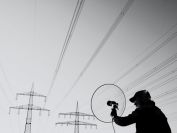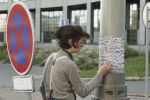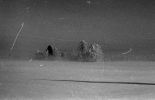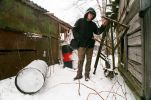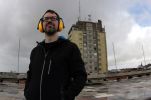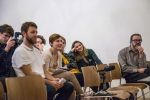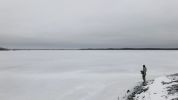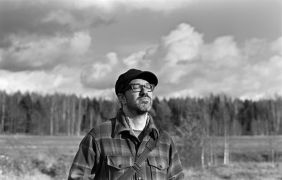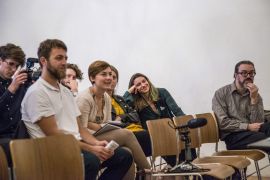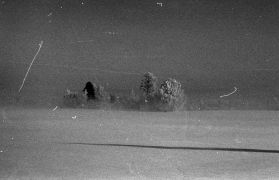John Grzinich has been active since the early 1990s as an artist and cultural coordinator combining sound, image, site, and collaborative social structures. In 2011 he led a workshop in Łódź, and in 2015 Aleksandra Jach, curator of the Museum of Contemporary Art, interviewed him about his ideas related to sound, space and the environment for her project The Anthropocene Index.
Grzinich originally studied architecture, and in the early 1990s began to concentrate on sound and experimental music. He has collaborated with a number of musicians using field recordings, such as Michael Northam and Hajpeth Nehil, and has released a number of CDs. In addition to sound, Grzinich’s work also makes use of photography, video and movement in space.
Once, while making his way to St. Petersburg, Grzinich stopped in Estonia, where he eventually settled. In 2001, together with his spouse Evelyn Grzinich, they founded and ran MoKS, a small community center for art and social practice. For many years, Grzinich devoted himself to lectures and teaching activities, often leading workshops aimed at sharpening our sensitivity to the sonic environment. He has lead many such workshops, which have taken place in Prague and in many cities in different parts of the world.
This short reviewed interview reveals Grzinich’s way of thinking about the medium of sound, which, in its focus on social and psychological transformation, differs from the perhaps more typical appropriation and instrumentalization of natural sounds in contemporary musical production.
Aleksandra Jach: I understand your artistic practice has a good example of an emphathetic attitude towards environments. It means that you sense nuanced relations and try to follow them in your works. This is how I perceive the your 'nature culture documentaries' which help to understand the ecosystems of listening and recording. What do you think about the idea of ‘sound conservation’? There are more and more sounds related to animals, specific places, human activities, which will soon be lost. Do you think that we should register them for future generations?
John Grzinich: This is a very difficult question. The simple answer is that there's no reason not to record anything because it is relatively easy. Having access to more information is helpful for environmental research as the systems we need to study are extremely complex. On the other hand, the more we know, the more we realize how much damage is being done to the delicate webs of life at the expense of ever expanding human activity. The risk is that, future generations, will feel ever more compelled to preserve what little is left and devote too much attention to reconstructing the past. I've seen this with folklore and music that relies on a limited set of photos and sound recordings, around which whole movements and even national identities are constructed. I feel the focus of my work has been more about developing an awareness of the environment through what we sense, so that we can live more in the present than in the past. Recording capability is more of a tool for building relations, than a method for preservation.
I would like to follow your observation that environment conservation can be instrumentalized and serve as a fundamental construction of national identities. What is the difference between the ways Americans and Estonians use "nature" to construct their identity?
I guess one could write a book about such a topic so I will have to generalize greatly. The role of 'nature' plays a big part in the construction of national identity in Estonia, much of it coming from the fact that only two generations ago Estonians were predominantly rural dwellers who lived off the land (there is a term for signifying 'tradition', maarahva meaning land people). But like the rest of the world, Estonia has 'modernized' and most people live in cities or larger towns, so the cultural understanding of 'nature' has been romanticized . Values of conservation have been greatly instrumentalized to support land use policies. For example the state forest management agency (RMK) and the state run energy sector, have carried out very thorough greenwashing campaigns in recent decades to shift public attention away from increased deforestation and the heavy dependence on non-renewable fossil fuels (oil shale mined in the northeast part of the country). The trajectory of environmental consciousness in America has its own storied history with early conservation policies of the Theodore Roosevelt era being very much a battle ground in the struggle to shape the identity of the rapidly growing nation. Unfortunately the early ideas of conservation of 'wilderness' and pure nature' were also rooted in beliefs around privilege by way of class and racial superiority. Many early Sierra Club members were openly racist with some key members like Madison Grant and Henry Fairfield Osborn (close associates of John Miur and Roosevelt), founding the modern eugenics movement at the same time as the creation of the National Park system. Both policies were being done in the name of conservation. This dark legacy is finally being confronted, long after the contemporary ecology moment has largely dismissed conservation as a means of 'protecting nature', despite it still being a widely accepted public belief. For more on the American historical context, I suggest Jeddiah Purdy's book 'After Nature, A Politics of the Anthropocene'.
It is difficult to find places which are not anthropogenically affected. Maybe this is the reason why we are so relentlessly looking for “nature“ nowadays. We are concerned with the sounds of a natural landscapes. I studied the titles of the files you shared on Soundcloud (“blackbird and dawn chorus”, “evening solitude: six nature sound recordings”, “frog pond”, “river's edge at dusk”) and it made me think about how you define ‘nature’ … What is so interesting about dealing with non-human sounds?
Humans have become anthropocentrically oriented, that is, they can only seem to relate to a human centered, human managed world. I don't believe it has always been this way. It wasn't too long ago that work, food, material production and even spirituality, all revolved around natural extra-human cycles beyond our control. Now we only project those cycles onto our lives in ways that make us feel connected to "nature" even though there is an ever growing disconnect. Of course the idea of "nature" is a construct, because we are every bit as natural as the plants or animals that grow around us. The difference is, we shape the environment to suit our needs and in doing so, we shape our understanding of what "nature" is, which becomes less about us and more an imaginary external realm. So how do we re-connect with our own nature? For sure listening is a good start. Listening for me is a form of 'letting go', of opening up to what can be perceived beyond our rational understanding of the (anthropocentric) world. As much as we know, there is very little is what we understand in how, for example, animals, fish, and insects communicate, all of whom use sound and vibration. The interest is finding ways to somewhat tune-in to all the living communication happening around us, enough at least to reclaim the balance in how we relate to our environment.
We were working together in 2011. Katarzyna Sloboda and I invited you to do the workshop on the post-industrial specificity of Lodz. How do you remember this experience? How did you perceive the urbanized nature of this place?
Łódź is a rather extreme case of a post-industrial city, which allows an incredible amount of space for exploration and experimentation. Because of this it is a much more interesting place to work, than for example many western cities that have been entirely re-territorialized by the purely functionalist and economic interests that have dominated the post-war world. This doesn't necessarily make it an easy place to live and work, but it does give opportunities that you can't find in many places. A good example was the area around the train station where we could wander freely or even better yet, the (sewer tunnel) museum that we could use for site-specific experiments. To be able to go from workshop experimentation to developing a full public performance in a few short days is extremely rare. In New York or London, such an action could take years of preparation if it would even happen at all. Of course having a great group of participants and a community surrounding your project was very helpful, but the conditions of the urban space needed to be there.
I also appreciate that Lodz is still a place where many things can happen. I wonder what will be the next step for Lodz’s development? I wonder how the city will evolve and if the human potential - these friendly communities - will disappear or not... Lodz was often compared to Detroit as a picturesque example of post-industrial ruin. Within 'Urban Ecologies' we wanted to show that we cannot only think about this place in a negative sense as being defined by lack of something. It was a pleasure to work with you and demonstrate the opposite.
You’re very right about the need to counteract the aestheticized image of post-industrial cities as a collection of ruins, abandoned spaces, relics of the past etc, with programmed activities that deal with the spaces and current social issues of the city. Beyond the image, the reality is that post-industrial cities have allowed a great deal of fermentation for subcultures, artists, creative communities etc. throughout the postwar period, each having its own “ecology” of sorts. Unfortunately in recent years, I’d say that these cultural ecologies, have come under greater pressure to conform or integrate into wider global ideologies, rather than develop or grow within the local context. There is a lot I could say on this, but it is important to appreciate and work with what you have. Given my own positive experience in Lodz, there is plenty to work with.
In many interviews you emphasized that working with sound, for you, means sharing, common listening and playing. How does the MoKS residency which you run with Evelyn Grzinich help you in it?
Much of what I have developed workshop-wise would not have come about without MoKS. Although MoKS is in a rural village, I still see it as a 'space apart', in which using art for exploring and experimenting with, lets call it - social transformation, has always been important. While creativity can happen in the most confining situations, there are certain conditions that facilitate processes that we've found stimulating for artists. In the case of MoKS, my own interests have shifted away from sound as a means of artistic expression via technical reproduction (with its formal artist/audience relation) to working with sound as a mode of social communication, sharing an environmental awareness. The field of so called 'sound art' has developed quite rapidly over the last 15 years or so, but this has brought about a kind of double edge sword in terms of artistic purpose. The recent interest in sound can clearly be attributed to technological developments that allow people to access the processes of recording, composing and playback that was once fairly exclusive. And yet at the same time there is a risk that these technological conveniences and dependencies foster an attitude of accepting conventions around terms like 'sound art', 'digital music', 'field recording', etc. I don't want to go into too much detail here, but basically I feel its important to balance all of this with a more grounded approach with sound where listening and performative practices work with the inherent open and shared nature of the medium, that bridges the meditative with the ecstatic, the solitary with the inclusive, the personal with the invasive, the abstract with the semantic, the inaudible with the physical and even the conscious with the unconscious.
This interview was first published in 2015 in The Anthopocene Index and took place thanks to the support of the Ministry of Culture and National Heritage of Poland.
